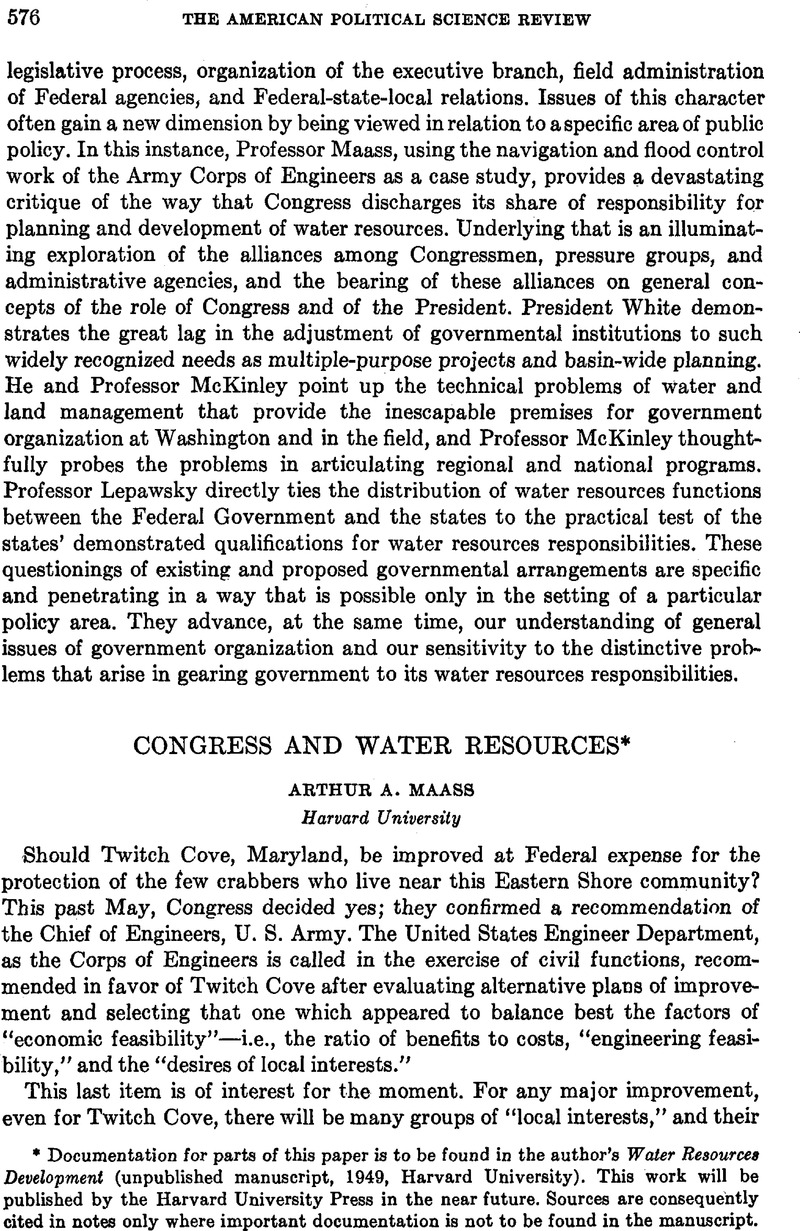Published online by Cambridge University Press: 02 September 2013

page 577 note ** Arrangements relating to Congress, the Corps of Engineers, and the President are discussed. No effort is made to deal in any detail with the relations of Congress and the Bureau of Reclamation because of space limitations and the fact that Corps arrangements constitute the more controlling factors in legislation for water resources. This has become more the case in the last few years. Where the Bureau and the Corps have been in competition since 1936, the Secretary of Interior has sought support of the President's office to offset support which the Corps has gotten from Congress. But even with the President's support, the Secretary has not had great success in getting his programs adopted. As a result, the Bureau of Reclamation and its supporters in Congress, the Western irrigation bloc, have begun to use the same legislative techniques which have meant such “success” for the Engineers. Adoption of these techniques has been limited, however, by the fact that support of the reclamation program of the Bureau is restricted in Congress to the Western bloc; whereas support of the navigation and flood control programs of the Corps is found in representatives from all areas.
page 579 note 1 In the House, Committees on Rivers and Harbors or on Flood Control prior to 80th Congress; now Committee on Public Works. In the Senate, Committee on Commerce prior to 80th Congress; now Committee on Public Works.
page 580 note 2 A recent restatement of the major issues by Radway, Laurence I. and this author can be found in “Gauging Administrative Responsibility,” Public Administration Review, Vol. 9, pp. 182–193 (1949)Google Scholar.
page 584 note 3 Message to Congress in approving H.R. 5472, the rivers and harbors bill. Printed In New York Times, May 23, 1950.
page 584 note 4 White House Press Release of January 3, 1950.
page 586 note 5 Commission on Organization of the Executive Branch of the Government, Task Force Report on Natural Resources (Washington, 1949)Google Scholar, Appendix 5.
page 588 note 6 The report of the Senate Committee on Expenditures contained the following:
“By far the largest number of witnesses appeared in behalf of the exemption of the civil functions of the Corps of Engineers, including representatives of valley improvement, flood control and development associations, chambers of commerce, and other State and civic organizations: 17 of the 25 witnesses appearing at the hearings, and 14 of the 23 resolutions and communications submitted for the record, were in support of such exemption. In addition, hundreds of telegrams and letters from 44 States and the District of Columbia were received by the committee, expressing opposition to granting any re-organization authority to the President which would permit the transfer of the civil functions of the Corps of Engineers to any other department or agency ….
“An amendment to exempt the civil functions of the Corps of Engineers, offered by the chairman [Senator McClellan], was defeated by a vote of 5 to 4. Several members of the committee indicated, however, that in voting against this exemption they reserved the right to favor such exemption should the Senate not approve the amendment providing for disapproval of reorganization plans by either the House of Representatives or the Senate.” Senate Report 232, 81st Cong., 1st Sess., pp. 12–15, 17 (April 7, 1949).
page 590 note 7 Tanner, Elaine, The Function of the Modern Legislature (unpublished manuscript, 1950, Radcliffe College)Google Scholar.
page 591 note 8 See especially his Constitutional Government and Democracy (Boston, 1941)Google Scholar. A new and revised edition of this excellent work is now in press.
Comments
No Comments have been published for this article.